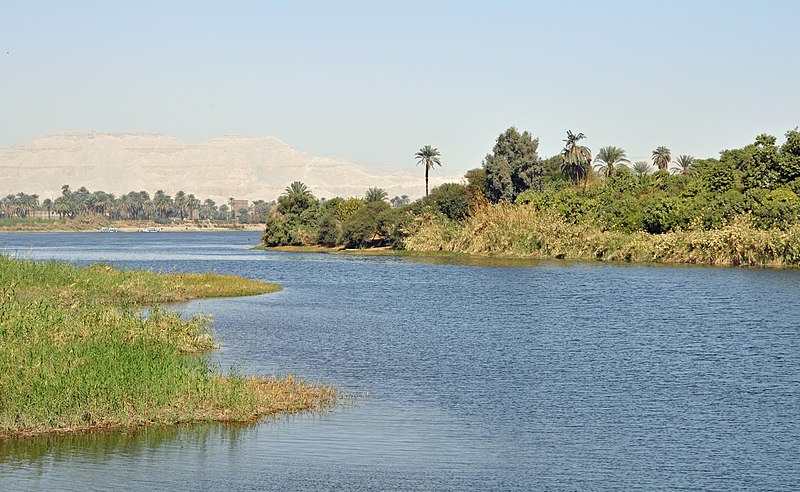History 8 Egypt Questions
Return to History 8 Egypt Questions
1. Detail the importance of the Nile River to Egypt.
The Nile is the longest river in the world, running through a total of 4,160 miles. The luscious green and rich land located on the banks of the Nile hosted the zig zags and patterns of Egyptian towns and cities that ran along it. Infact, the Egyptians were so grateful for the Nile that they began to worship it as a divine force. Not only was it divine, it was the sole foundation of the ancient Egyptian civilization, allowing annually rejuvenated soil for farming and agriculture, excellent transportation, direct trade routes throughout Egypt and northern Africa, and a source of fresh water for citizens. It also provided a habitat for the Water Lilly, which became the national symbol of Egypt.

Bibliography:
"http://upload.wikimedia.org/wikipedia/commons/thumb/0/05/Nile_R02.jpg/800px-Nile_R02.jpg"
"Gift of the Nile" Manual for Cultural Foundations of Ancient Civilizations. By Rosie Beniretto and Clay Elliott. Vol. 2. Houston: St. John's School, 2012. 125. Print.
Class video notes entitled "Egypt".
- Max Blekhman
2. How and why did the Egyptian view of life differ from the Mesopotamian outlook? (open for correction rb)
The Egyptian life differed from the Mesopotamian outlook in the way they acted, socialized, and their overall life. The Egyptian lived by the Nile, a fresh farming land that provided necessary food, water, and shelter. Because of their excellent farming conditions, the Egyptians were successful. As we know, the Mesopotamians were very pessimistic people, but the Egyptians were very optimistic. As a result, the Egyptians had more success at communicating with others and thus having a more successful life.
Site: Manual
-Sophie Clayton
3. What lay at the heart of Egyptian civilization? (open for correction rb)
The heart of the Egyptian civilization was the Nile river. This amazing stretch of water created a sancuary of green, and prosperity in a barren desert. The Nile river also connected a community of people along the river and allowed for a fast and easy spread of goods, people, and ideas. The many marshes created by the Niles delta, also resulted in the plant papyrus, leading egypt to a whole new range of product and ideas that they could make from this new plant.
Site: "The Gift of the Nile" video notes
~Frances Hellums
4. What was significance of the temple in this civilization?
5. Name and explain the mainstays of Egyptian civilization.
6. Describe the key themes of Egyptian history.
There are three main key themes of Egyptian history. They were set down early in their civilization. These themes are centralized power, royal rituals, and the cult of the dead. All of these three themes are intertwined to create the ideology of the world's first state.
Centralized power is putting all the sources of power in one place. This includes a capitol city, and a commonplace where all the people who ruled are.
Royal rituals includes the example in, Eater of Souls when the people must bow down to King Tut and kiss his feet.
Cult of the dead is to preserve the memory of the dead by using drawings of them placed on their graves or tombs. There is usually another usually and inscription with their names and achievements as well. It began with the portrait statue of King Djoser (second king of the 3rd dynasty [c. 2686–c. 2613 bc]), found in his step pyramid. For more information about the cult of the dead, visit: http://www.britannica.com/EBchecked/topic/154596/death-rite/66364/Cult-of-the-dead#ref538175

-Victoria Lima
Sources:
Manual p. 127
http://www.britannica.com/EBchecked/topic/154596/death-rite/66364/Cult-of-the-dead#ref538175
Image from: www.gks.uk.com/hathor-isis-egyptian/
7. Explain the role of the pyramid and the legitimation of authority in Egypt.
8. Give as many reasons for the collapse of the Old Kingdom as possible.
9. What kind of state or society existed in the Middle Kingdom?. Give Examples
10. What changes occurred in the New Kingdom?.
11. Detail the greatest change in thinking in the first millennium B.C.
12. Explain what Ibn Khaldun, the Islamic historian, meant when he called Egypt the best example of the habit of civilization.
13. How did the Egyptians conceive of the universe and the civil state?
14. Define and explain the concept of ma'at.